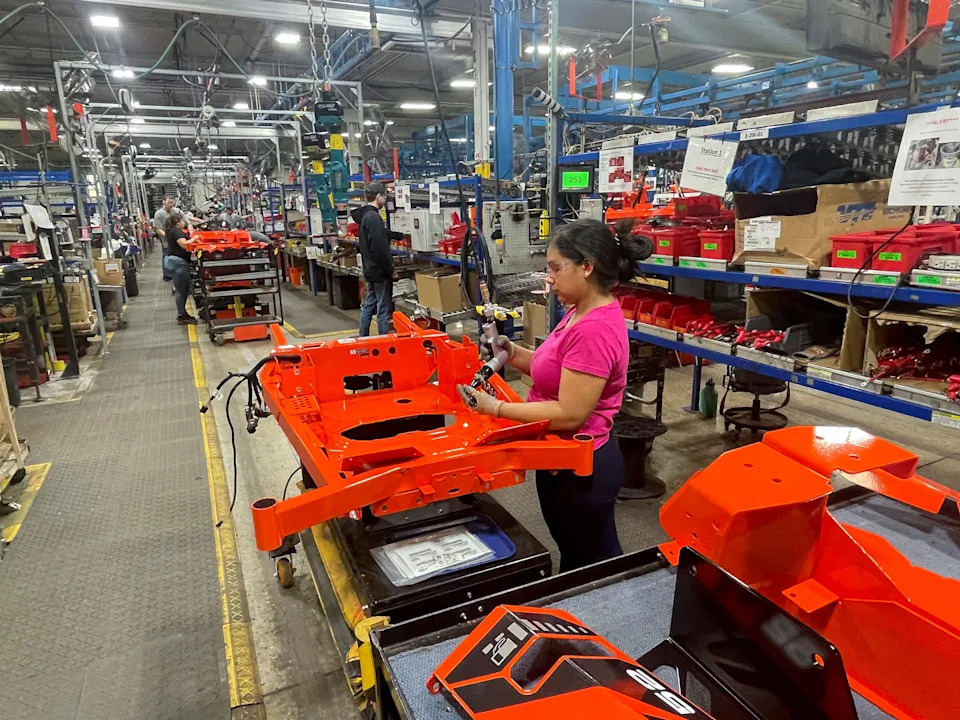News
Wholesale costs fell in April but consumer price increases are likely on the way
A sharp drop in wholesale prices last month signaled a few key takeaways about the outlook for U.S inflation and the economy .
President Donald Trump ’s tariffs appear to be holding down inflation for now, especially for services such as air travel and hotels, as uncertainty dampens consumer demand.
But the levies are squeezing the profit margins of manufacturers and retailers, signaling that the impact on consumers is coming, economists say.
At the same time, businesses are likely to absorb at least some of the higher costs, a development that will likely slow investment and hiring and weigh on economic growth.

What is the Producer Price Index?
U.S. producer prices – which are paid by manufacturers, wholesalers and retailers – unexpectedly fell 0.5% last month, the largest decline in five years, according to the Bureau of Labor Statistics and JPMorgan Chase.
On an annual basis, prices rose 2.4% compared to a 3.4% increase in March after upward revisions.
Wholesale service costs fell 0.7%, the largest pullback on record dating to 2009. More than two-thirds of the drop could be traced to a 1.6% decline in trade services, which measures changes in wholesaler and retailer profit margins.
Are hotel rates coming down?
Prices for hotel and motel rooms fell 3.1%; airfares fell 1.5%; and transportation and warehousing slid 0.4%. Financial service fees, which are based on a percentage of assets in consumers’ portfolios, tumbled about 7% as the stock market sold off in response to Trump’s tariffs, largely reversing a big rise in February as the S&P 500 index vaulted to a record high.
Meanwhile, food costs decreased 1% and energy dipped 0.4%.
But core wholesale goods prices, which exclude food and energy, rose 0.4%.
“Taken together, these data suggest that some firms are passing on tariff increases into goods prices, while others are reducing their margins – at least in the near term,” JPMorgan Chase wrote in a note to clients.
“This dynamic points to the possibility of a more drawn-out and, potentially, more muted increase in consumer prices due to the tariffs.”
Will Walmart raise prices because of tariffs?
Walmart warned on Thursday that it will start raising prices this month because of tariffs.
Yet a margin squeeze for many companies will likely curtail business investment and hiring, JPMorgan Chase said.
When can we expect the Fed to lower interest rates?
The mixed picture for inflation and the economy will likely extend the Federal Reserve’s pause , keeping it from quickly resuming the interest rate cuts it launched late last year as inflation eased, the research firm said. The Fed, which cuts rates to boost a flagging economy and raises them to fight inflation, could await more clarity as tariffs both drive up inflation and weaken growth – an unusual tandem.
In a speech Thursday, Fed Chair Jerome Powell suggested rates could be higher in the long term because of unexpected events that constrain supplies and push up prices. Trump’s tariffs and the COVID-19 pandemic are two examples.
“We may be entering a period of more frequent, and potentially more persistent, supply shocks — a difficult challenge for the economy and for central banks,” Powell said.
Inflation fell to a new four-year low of 2.3% in April, according to the consumer price index, released May 13.
That report, combined with the fall in wholesale prices, suggests that another inflation measure the Fed follows more closely rose only 0.1% in April, nudging down annual inflation from 2.3% to 2.2%, Barclays estimated.
A core reading that strips out food and energy costs likely also edged up just 0.1%, keeping the yearly price rise at 2.6%, Barclays said.
Contributing: Reuters
This article originally appeared on USA TODAY: PPI report: Wholesale cost drop hints tariffs will hit consumer prices

